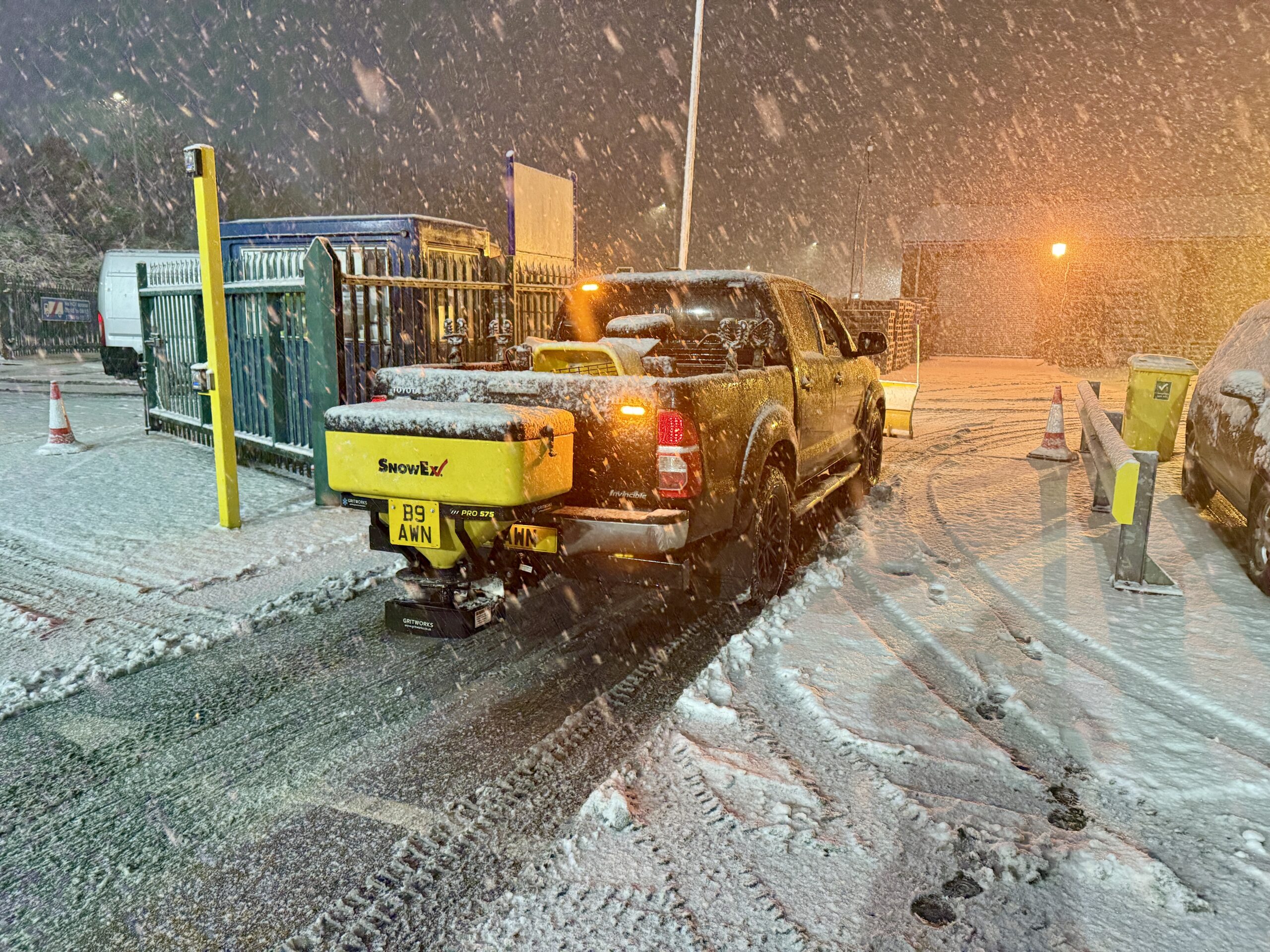White vs Brown Rock Salt: What’s the Difference?
White or Brown Rock Salt? When winter weather hits, keeping your premises safe and operational depends on choosing the right de-icing materials. At Bawcro Snow and Gritting Services, we offer dependable gritting in Yorkshire and the North of England. We use high-quality white rock salt to keep roads, car parks, and footpaths clear and safe all season long.
One of the most common questions we are asked is: what’s the difference between brown rock salt and white rock salt? Both are effective at melting snow and ice, but they have different properties and are suited to different types of sites.
This guide explains the difference, their advantages and why white rock salt has become the most widely used material in our Bawcro fleet.
What Is Brown Rock Salt?
Brown rock salt, sometimes called grit salt, is mined underground in the UK. It contains natural impurities such as clay and sand that give it its coarse texture and distinctive brown-orange colour.
These impurities add a gritty quality that improves traction on icy surfaces. As vehicles or people move over a treated area, the coarse particles create friction. This helps stop slipping or skidding.
Brown rock salt is mined in large amounts from underground reserves. This makes it the cheapest choice for covering big areas. It is often used on public roads, big car parks, and industrial areas. Here, the focus is on performance and value, not appearance.
However, one drawback is the residue it leaves behind. Once ice has melted, a brown film can remain on the ground, which is easily carried indoors on footwear or tyres. For some sites this is not an issue, but for places where presentation matters, it can be inconvenient.
Advantages of Brown Rock Salt
- Excellent traction – the natural grit improves surface grip and reduces slips.
- Visible coverage – the brown colour shows exactly where has been treated.
- Cost-effective – ideal for large areas or high-volume gritting routes.
- Locally sourced – mined within the UK, ensuring consistent supply.
At Bawcro, we still provide brown salt for tough places where grip and cost are the top concerns. It is dependable, strong-performing and a practical choice for industrial environments.
What Is White Rock Salt?
White rock salt is a premium, high-purity de-icing material created through the evaporation of seawater. Its refined composition gives it a bright and clean look with few impurities. This means it leaves almost no residue after use.
At Bawcro Snow and Gritting Services, we mainly use white rock salt for our gritting operations. It provides excellent melting performance. It also gives a cleaner finish and a professional look. This reflects well on every site we work on.
Unlike traditional brown salt, white rock salt keeps surfaces clear without leaving marks or staining. It’s perfect for places where presentation is important. This includes schools, healthcare facilities, retail parks, business entrances, and pedestrian areas. It provides both safety and a clean look.
Because it is pure, white rock salt dissolves quickly and evenly. This helps us get fast results with less waste. It also makes post-gritting maintenance easier, as there’s no brown residue to sweep away once the frost has lifted.
Our commercial clients consistently choose white rock salt for its combination of performance, cleanliness and reliability. It’s the smart, professional solution for organisations that want safe sites and spotless results all winter long.
Order white rock salt for driveways and paths with free local delivery here.
Advantages of White Rock Salt
- Cleaner results – leaves surfaces bright with no brown residue.
- Professional appearance – ideal for customer entrances, schools and hospitals.
- Reduced mess – less salt carried indoors, keeping floors and carpets clean.
- Effective melting – performs consistently during sub-zero temperatures.
Although white rock salt costs slightly more, its benefits outweigh the difference for most businesses. It is efficient, long-lasting and aligns with the professional image many of our clients wish to maintain.
White vs Brown Rock Salt: The Key Differences
Both brown and white rock salt lower the freezing point of water to prevent ice formation, but their physical characteristics set them apart.
| Feature | Brown Rock Salt | White Rock Salt |
|---|---|---|
| Source | Mined underground in the UK | Evaporated seawater (solar salt) |
| Colour | Brown / orange | White / translucent |
| Texture | Coarse, gritty | Fine, smooth |
| Residue | Leaves brown marks | Leaves little to no residue |
| Grip | Excellent traction | Slightly less traction |
| Cost | Lower cost | Higher cost |
| Ideal Use | Roads, car parks, industrial estates | Schools, retail parks, offices, hospitals |
At Bawcro, both are available, but white rock salt has become our standard for most gritting contracts. It offers a cleaner result, fewer complaints from site managers and reduced follow-up cleaning costs once the frost clears.
Which Rock Salt Is Best for You?
The right choice depends on your priorities – cost, cleanliness or traction.
Choose brown rock salt for:
- Heavy-traffic outdoor areas such as service yards and industrial estates.
- Sites where dirt transfer is not a concern.
- Cost-efficient coverage of large car parks or private roads.
Choose white rock salt for:
- Schools, hospitals, and retail sites with public access.
- Business entrances or areas where presentation matters.
- Any location that requires minimal residue and easy maintenance.
At Bawcro Snow and Gritting Services, we typically recommend white rock salt for most commercial, retail and educational sites. Its clean finish, proven performance and reduced cleaning requirements make it the most practical and professional option.
Order white rock salt 25kg bags for home or business delivery here.
Environmental and Practical Considerations
Both brown and white rock salt are effective de-icing materials, but how they are used makes the real difference. At Bawcro, we focus on precision application and sustainable spreading methods.
Our operations team monitors live road surface temperature data throughout the winter season. This allows us to apply salt proactively, only when conditions require it. By doing so, we reduce waste, save resources and minimise environmental impact.
We store all our salt safely. It is loaded into our fleet using controlled systems. This helps prevent spills and contamination. Our white rock salt is chosen for its high purity and efficiency. This means you need less product to get the same result.
Frequently Asked Questions
Is white rock salt better than brown rock salt?
For most commercial and public sites, yes. White rock salt provides a cleaner finish, less mess and maintains a professional look while still melting snow and ice effectively.
Does white rock salt work faster than brown rock salt?
Both perform similarly in melting ice. The key differences are appearance and residue rather than melting speed.
Can I mix white and brown rock salt?
Yes. In some cases, we blend both to balance cost and cleanliness. Mixed applications are useful for sites with both car parks and pedestrian areas.
Why does Bawcro mainly use white rock salt?
White rock salt is preferred at most of our sites. It does not leave visible stains and needs less clean-up after use. It also aligns with the professional image expected by our commercial clients.
Is brown rock salt still available from Bawcro?
Yes. We continue to supply and use brown rock salt for large industrial or outdoor environments where appearance is less important and maximum traction is required.
Get Expert Advice on Brown and White Rock Salt
If you’re unsure which option suits your site best, our experienced team can help. We’ll review your layout, traffic type and safety requirements before recommending the most suitable salt for your conditions.
We offer 24/7 winter gritting services across Leeds, Bradford, Wakefield, Halifax, Huddersfield, Greater Manchester, Mid Wales and surrounding areas, using the latest equipment and weather monitoring technology to stay ahead of frost and snow.
To discuss your winter plan or request a quote, call 0113 403 5113 or contact us online.
Straightforward service. Always ready. Always local.

